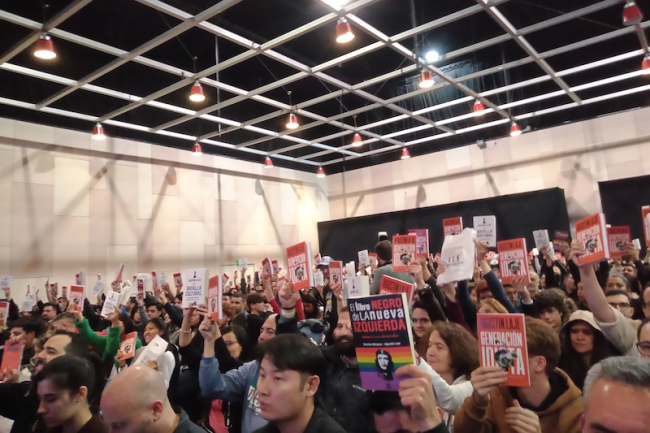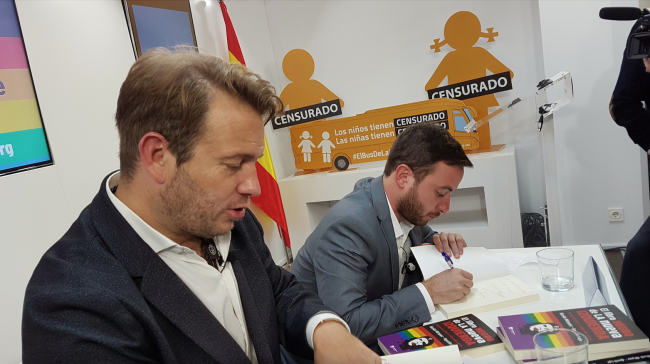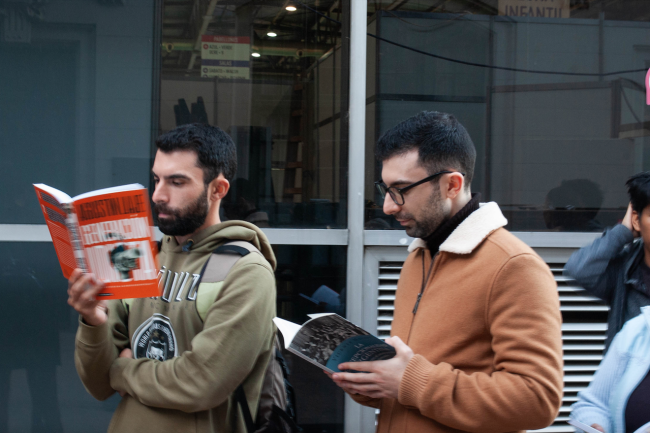
This piece appeared in the Spring 2024 issue of NACLA's quarterly print magazine, the NACLA Report. Subscribe in print today!
On May 3, 2023, the young right-wing intellectual Agustín Laje presented his latest book, Generación Idiota, at the Buenos Aires International Book Fair. Introducing the event, Andrés Mego, director of the book’s publisher, Hojas del Sur, took the microphone from the lectern and greeted the more than one thousand young people who had filled the José Hernández room, the largest at the fair. He asked the audience to raise their books high. Hundreds of copies of Generación Idiota and other books by Laje—such as his 2016 The Black Book of the New Left, coauthored with Nicolás Márquez, and 2011 Los mitos setentistas (The Seventies Myths)—shot into the air for an iconic photo conveying what these books meant to their readers.
Mego commented in a post on social media that Generación Idiota offered a guide to understanding the new global reality. And not only that. He continued: “‘If the book we are reading does not wake us, as with a fist hammering on our skulls, then why do we read it? … A book must be an ice axe to break the sea frozen inside us,’ as Kafka said. Generacíon Idiota is that new axe. A book dedicated to young people who could not be made into idiots, to young people who long for and seek a better world, and who are willing to fight the battle for freedom: Generación Idiota is that book that is uncomfortable for many, but that was made to make us think.” Following a similar narrative, in closing his speech the afternoon of the book launch, Laje asked his audience to take his books seriously. He urged them not to just watch his YouTube or TikTok videos—created to capture attention and circulate his ideas on social media— but to also value his book as a tool for education. Through these artifacts, he aims to encourage his audience to advance the culture war of the new right.
Taking the book world and its scope as a starting point, we have attended events and spaces of right-wing sociability since 2018. At the time, this phenomenon of the growing popularity of authors and influencers who present themselves as “politically incorrect” was just emerging, and it was still considered a marginal subculture—active in the digital world, but incapable of having political weight. Many of our colleagues in the social sciences and journalism described this “youth subculture” as an ardent group of men who, when faced with not being able to deal with the transformations of the day, especially new relationship norms in the times of feminism, “turned” to the right.
Through ethnographic research, our fieldwork has allowed us to directly record this phenomenon, which transformed from small to massive. Ever since we began venturing into events and book presentations, the audiences have grown at a rapid pace, and the profiles of people in attendance have become increasingly diverse, surpassing our initial categories and assumptions. Together, these spaces of online and offline sociability can be read as a sample of the processes of generation, consolidation, reproduction, and expansion of ideas, emotions, values, and practices that make up the “cultural subsoil” of the political movement that has governed Argentina since December 2023 under President Javier Milei.

Laje, for example, speaks to young people like Demián, a student from the southern part of Greater Buenos Aires who discovered the author through YouTube videos in 2018. Amid the debate over the bill on the voluntary termination of pregnancy in Argentina, Laje’s content enabled Demián to form an opinion against the abortion law. The same thing happened to 21-year-old Carlos, who accessed Laje’s work through social media, then bought and read The Black Book of the New Left. The book helped him gather sources and data to participate in debates about “gender ideology” and “cultural subversion.” Romina, 41, a professional from Buenos Aires, read Los mitos setentistas and then, at the book fair, bought Generación Idiota and La batalla cultural (The Cultural Battle), another one of Laje’s recent books, to read, share, and discuss with her husband.
Thinking, informing themselves, arguing, analyzing, discussing—these are some of the ways these authors, editors, and readers define their connection with the book world. This world produces cultural artifacts that help people position themselves against adversaries and peers in the “culture war” that the radicalized right has been pushing for several years through opinions they present as irreverent and against “political correctness.” In different fields and through distinct mediums, vocabularies, and platforms, these forces have recently launched a battle, in name and in practice, against all forms of progressivism or “cultural Marxism”—a wide umbrella term that includes everything from feminisms and the defense of human rights policies, to center-right governments and public education, which is often considered a space for indoctrination. These and other urgent topics, such as the proposal to put an end to years of economic crisis in Argentina with dollarization, have dominated the agenda in recent years. These issues were also part of the winning platform in the 2023 presidential elections that landed libertarian economist Milei and his La Libertad Avanza party in the Casa Rosada.
In this changing political era, in the world in general and Argentina in particular, youth are undisputed protagonists. The historical association between youth and left-wing culture that prevailed in decades past should be revisited today in light of the growth of the irreverent and “rebellious” extreme right. According to a 2023 poll by the consulting firm Sentimientos Públicos, 43 percent of Argentines surveyed perceive themselves as right-wing or center-right. This perception is more marked in young people. According to the poll, older people are more inclined toward the left, with 23 percent of respondents over 56 identifying as “center-left,” the highest percentage of any age group in this category. Young people 25 and under, on the other hand, were the age group most strongly identified with the “right” at 34 percent. The presidential election confirmed this trend: voters under 25 were most likely to cast a ballot for Milei, according to pre-election polls.
A Cultural and Political Phenomenon Scales Up
The first time we attended a conference with far-right intellectuals was on December 12, 2018, in the traditional Spanish Club located in central Buenos Aires. The star presenters were Agustín Laje and Nicolás Márquez. That afternoon, a heavy downpour cast doubt on the event for fear that the bad weather would harm turnout. But that didn’t happen. Despite the rain and lightning, the event was a success. The leading figures entered the room with their umbrellas in hand, extending triumphant gestures to the nearly 300 young people who had gathered to hear them speak—a good turnout at the time.
Up until then, these gatherings still retained some rituals typical of “niche” consumption. The audience was divided in similar proportions between friends and acquaintances of the authors and attendees with no personal connection to the speakers. Like fans of small-run comics or groupies of bands from the underground music scene, some young people were able to exchange a few words with the presenters at the end of the conferences and even snatch their cell phone numbers or emails to stay in touch. The young age of the attendees began to attract the attention of the authors themselves. At the event at the Spanish Club, Laje confessed that he had been psyching himself up for the end of his brief intellectual career, since the readers he had garnered in his earlier writings about 1970s Argentina were mostly older adults. Far from that forecast, his career was about to take off.
It was during the first phase of our research in 2018 when we met Santiago, a 23-year-old Catholic activist and political science student at a private denominational university. Santiago could tolerate different opinions on economics, but he would not negotiate on what, in his reading, constituted “essential values” such as life and the family. These values had been transmitted to him through his paternal and maternal grandparents, all of them linked to the military. His parents had discontinued that inherited vision, but Santiago took it up again from a “value-based” position. In defense of these principles, he began to actively participate in “pro-life” marches organized in 2018, when Congress was debating the legalization of abortion. In the name of those principles, he also bought and read several books about the 1970s by Laje and Victoria Villarruel, now vice president, which explained how “subversive terrorism” had attacked thousands of Argentine homes and families.

Initially, in Argentina, the phenomenon of the extreme right was positioned around these specific topics historically raised by local right-wingers. Discussion about the recent past from a rereading of history that proposes a perspective of “complete memory” regarding the political violence of the 1970s is one of their frequent weapons. From justifying to vindicating or denying military action, the first books by Márquez, such as La otra parte de la verdad, and by Laje addressed these topics, allowing these authors to make the rounds on social media.
Laje owes a lot to the discussion about the 1970s. It was through this topic that he met his teacher Márquez and became his “disciple.” His first book protesting the dictatorship, Los mitos setentistas, published in 2011 at his own expense, made him known in the military world and gave him access to nationalist and Catholic networks that allowed him to travel outside his native province of Córdoba. The 1970s matter a lot to those who have followed Laje from the beginning. The possession of knowledge about the “other side of the truth”—that part of Argentine history that “they don’t teach you in school”—is what allows us to distinguish between the seasoned readers and the amateur, between early followers and newcomers to the right-wing world.
However, the topic that made these authors more well-known is their position of seeking to protect the traditional values of the heteronormative family. They make this case based on a series of arguments and causes in opposition to so-called “gender ideology,” a concept initially coined in Catholic discussions in the 1990s that has brought together religious and secular people in its offensive. In the context of the debates in 2018 on the law proposing the voluntary interruption of pregnancy, the cry against “gender ideology” began to function as a pivot point for reactionism and activism against feminisms, sexual and reproductive health policies, and comprehensive sexual education in schools. The rise of feminist mobilization and the public and political discussions that these struggles enabled had reactionary parallels in different spaces and cultural productions that discussed them.
Read the rest of this article, available open access for a limited time.
Ezequiel Saferstein is a sociologist and CONICET researcher at the Center for Book Studies and Public Policies of the Interdisciplinary School of Higher Social Studies (UNSAM), where he coordinates the Contemporary Political Book Studies Program. He is the author of ¿Cómo se fabrica un best seller político? (Siglo Veintiuno, 2021).
Analía Goldentul is a sociologist with a PhD in social sciences from the University of Buenos Aires. She is currently a CONICET postdoctoral researcher at the Institute of Geography, History, and Social Sciences. She is a member of the Contemporary Political Book Studies Program at UNSAM.

